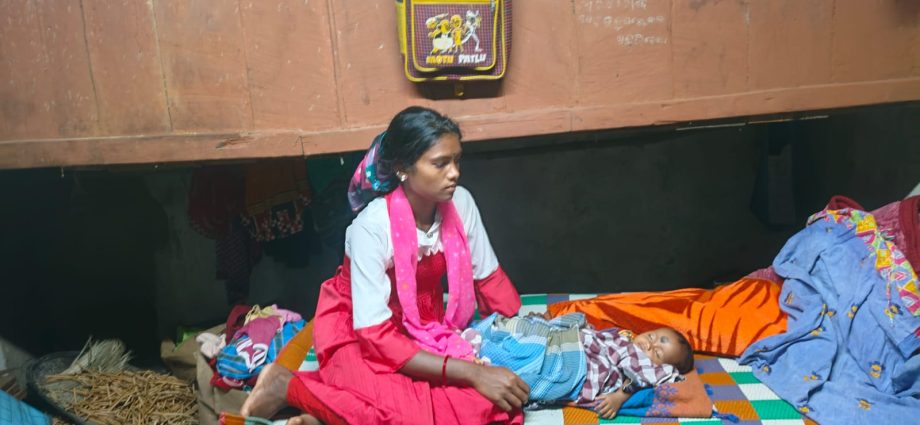By Matters India Reporter
Bhubaneswar, Nov 15, 2025: A four-member team that probed food poisoning deaths in an Odisha village blames the eastern Indian state’s negligent public distribution system among other reasons.
“The families in Mandipanka village had not received ration for three months,” the team, commissioned by the Odisha Khadya Adhikar Abhiyan (Odisha State Right to Food and Work Campaign) and supported by the Civil Society Forum on Human Rights, said in a press release on November 13.
Two women died on October 31 after consuming fungus-infested mango kernels in Mandipanka, a village in Kandhamal district. Another six women were admitted to hospital after they complained of continued vomiting and loose motion.
Kondh tribe and Dalits, most of them Christians, live in the village, some 55 km north of Daringbadi town
The team visited the village on November 8, as the political parties in the state indulged in a blame game. They were supported by Jagruti, a grassroots NGO, working in Kandhamal district.
They also visited the patients admitted in Maharaja Krishna Chandra Gajapati (MKCG) Medical College and Hospital in Berhampur and Srirama Chandra Bhanja (SCB) Medical College in Cuttack.
They undertook a quick assessment of the ground situation. Almost 90 percent of people in Mandipanka are the “Below Poverty Line (BPL)” category
The women fell ill after eating a gruel of mango kernel powder mixed with rice or ragi, a practice among Kondh tribal and Dalit communities in southern and western Odisha, especially during the food scare period of August-October.
“The mango kernels had developed fungus which could have led to food contamination,” the press report said.
Late onset of monsoons had led to the delay in sowing of paddy and millets in the district. Most small and marginal farmers in the region practice shifting cultivation.
“The awareness levels of the local communities on government development schemes and flagship programs are limited,” the team observed.
Prior to the team’s visit, officials of the district administration and Church representatives had visited the village and provided some food and cash to the victim’s families and others affected.
The team listed 11 reasons for the deaths such as lack of ration distribution leading to food scarcity, restrictions on local cultivation, and limited employment opportunities under government poverty alleviation schemes.
“Families in Mandipanka had not received ration for three months. In some districts of Odisha, ration distribution occurs every three months, leading to prolonged gaps for families relying on these supplies,” the team observed.
People in the region struggle to access sufficient food resources, during August-December, before the harvest.
“The amount of rice or ration provided is insufficient, lasting only about 10 days per month. This limited supply fails to cover the basic food needs of families,” the team said.
Under this circumstance, the people eat green spinach, yam, seasonally gathered from mountains, along with beans and papaya grown in home gardens. They cannot afford to buy vegetables, eggs or meat.
“Villagers holding job cards rarely receive work under the National Rural Employment Guarantee Act (NREGA), with a maximum of seven days. This restricts access to cash,” they added.
The forest department regulations prohibit the cultivation of pulses such as lentils, making it difficult for families to access protein-rich foods.
The 26-year-old woman, who died of food poisoning, had married four years ago, but her name was not listed in her husband’s family ration list. “This omission points to administrative negligence,” the team blames.
Another reason for near starvation among the people had not received help from the Subhadra Scheme in September, even after applying for benefits.
The Odisha government’s scheme aims to empower women through financial support, social safety nets, and digital literacy. The scheme is named after Subhadra, the younger sister of Lord Jagannath, the presiding deity of Odisha
The team also found a large exodus of local youth who passed the tenth grade because of unemployment. “They work seasonally in other states, such as Kerala, sending money back to their families and returning every few months,” the report said.
Although many villagers work as laborers, they lack labor cards, preventing them from accessing social security benefits in cases of accidents or death and other legible entitlements.
After the deaths, many groups helped the villagers with cash assistance.
“Mandipanka is a predominantly Christian village with a population of Kandh and Dalit communities practicing Baptist and Catholic faiths.
The team members were Bidyut Mohanty, social worker, Sister Sujata Jena, a lawyer, Ravi Shankar Behera, researcher and Rakhi Ghosh, a journalist.












